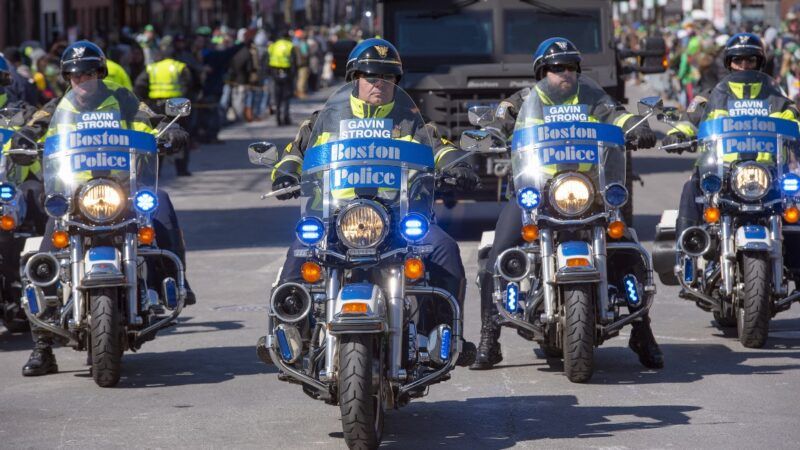Massachusetts Starts 2021 by Adopting a Process To Fire Bad Cops
The Bay State finally creates a police certification system.

The new year brings with it some important police reforms in Massachusetts. Republican Gov. Charlie Baker has signed into law a massive bill implementing a certification process for police in the state and a civilian-led commission to investigate misconduct claims.
Massachusetts was one of only five states to not have a process to certify or, more importantly, decertify police officers. Without such a system, police officers who engage in misconduct—even those who get fired for it—find ways to just move to another community and get rehired.
And yes, of course, there are plenty of problem police officers in Massachusetts. The Massachusetts State Police has been embroiled in a massive scandal in which dozens of state troops submitted fake overtime claims for hours they didn't work. Many faced criminal charges and 24 troopers were either fired or retired.
A Boston Globe investigation published over the summer found that the city's police department rarely ever believed complaints of misconduct levied against the officers, dragged their feet investigating these claims, and even when misconduct was uncovered, rarely handed down discipline more severe than an oral reprimand.
As protests and reform activism spread across the country last summer, partly in response to George Floyd's death at the hands (and under the knee) of Minneapolis Police, the state seemed primed for reforms. Massachusetts lawmakers hammered out a lengthy bill, "An Act Relative to Justice, Equity and Accountability in Law Enforcement in the Commowealth," labeled S.2963. As one of his last acts for 2020, Baker signed the bill into law.
"Police officers have enormously difficult jobs and we are grateful they put their lives on the line every time they go to work. Thanks to final negotiations on this bill, police officers will have a system they can trust and our communities will be safer for it." Baker said in a prepared statement, though in reality, the Associated Press notes, the police unions in the state fought hard to keep the law from passing.
The legislation creates a mandatory certification process put together by a majority civilian commission. The commission will maintain a database of certified officers in the state and will investigate and evaluate claims of misconduct. The commission will have the authority to strip certification from officers found responsible for misconduct, making them ineligible to work as police in the state.
California, like Massachusetts, was one of the few states left without a process to decertify bad police officers to keep them off the force (the other three are New Jersey, Hawaii, and Rhode Island). California lawmakers attempted last year to introduce a very similar certification process, but there, the police unions were successful in keeping the reforms from making it to the Assembly floor.
There's more to S.2963 than just police certification. The bill also puts some limits on (but does not eliminate) the use of no-knock raids and requires police to get a court order before using facial recognition tools in searches, except in emergencies. It bans chokeholds and firing into fleeing vehicles, except to prevent imminent harm. It bans the use of rubber bullets, chemical weapons (like tear gas), and police dogs to break up crowds. And in response to the aforementioned state trooper scandal, it creates a new criminal offense for any police officer who attempts to claim fraudulent work hours.
